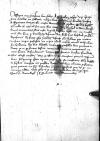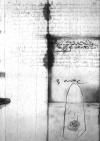List #1033
UNKNOWN do Ioannes DANTISCUSMarienburg (Malbork), 1533-11-04
| odebrano [1533]-12-03 Rękopiśmienne podstawy źródłowe:
Pomocnicze podstawy źródłowe:
| ||||||
Tekst + aparat krytyczny + komentarzZwykły tekstTekst + komentarzTekst + aparat krytyczny
Reverendissimo in Christo Patri et Domino, domino
Obsequia mea paratissima loco salutis.
Reverendissime Pater.
Intellexi ex scriptis Vestrae Paternitatis, quas cepi XVIII Octobris, me sollicitare reliqua bona, praeter pecuniam, sacerdotis intestati a
Interea temporis scrutinio intellexi sacerdotem illum obiisse intestatum. Mox ex officio Vestrae Paternitatis arrestavi pecuniam atque omnia bona sub quacumque specie reperire possint. In ista arrestatione dominus
Deus conservet Vestram Paternitatem in bona valetudine ad longa tempora.
Datum in

